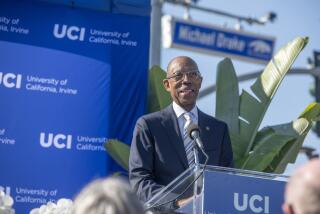Column: USC had lost its moral compass. Changes at the top were long overdue
It looked for a while as though USC President C.L. Max Nikias might survive a series of headline-making scandals that have rocked his prestigious university, which draws students from around the world.
He took shots the last two years from editorial writers, columnists and other critics but clung to the job and defended his reputation, insisting for the most part that he hadn’t been aware of any wrongdoing on his watch.
But as a team of L.A. Times investigative reporters broke more stories, faculty, students, alumni and parents became more shocked, and Nikias became more vulnerable despite having worked so many years to build USC’s endowment and reputation.
His critics rose up, his supporters backed off, and in the end the man who championed USC like no one before him became its biggest liability.
Late Friday afternoon, USC trustee Rick J. Caruso read me a letter he had just finished writing to faculty, staff, students and alumni. Caruso wrote that he had heard the voices of those who were indignant about the “harm inflicted on our students” by USC gynecologist George Tyndall, who has been accused of misconduct with multiple students.
And then the hammer.
“Today, President Nikias and the Executive Committee of the Board of Trustees have agreed to begin an orderly transition and commence the process of selecting a new president,” the letter said.
My first question for Caruso was whether Nikias had been fired, asked to resign or decided on his own to walk away.
“The statement speaks for itself,” said Caruso, who refused to elaborate.
The letter from the trustees said, “We have heard the message that something is broken.”
And across L.A., you could hear the roar of the obvious question: What took so long?
For professor Ariela Gross, co-director of USC’s Center for Law, History and Culture, the trustees’ action felt long overdue but still rectifying.
“We’re thrilled that they have heard the voices of so many members of the USC community who want to see new leadership and want the university to move forward, so that’s wonderful news,” said Gross, one of nearly 500 faculty members who had signed a letter demanding Nikias’ ouster.
“I’m actually crying,” Gross said as I read her the Caruso letter over the phone.
She said she had been unsure as to whether the faculty would take a stand and whether the school’s insular Board of Trustees — composed of some of the region’s wealthiest and most influential people — would take action on complaints from faculty and students.
In the end, there were any number of reasons to get rid of Nikias, despite his loyal army of defenders among the 59-member trustee board.
USC’s medical school dean hung out with criminals and addicts, his replacement was a doctor USC had disciplined for sexual harassment, and then came the stunning revelations about the gynecologist accused of abusing female students for years.
Nikias’ claims of ignorance, like his promise of reforms, became harder to accommodate.
But is he heading for the exits because of how he handled those matters?
Or is it because USC’s legendary fundraising potential and public image might have been dimmed, along with the allure for students?
Or because of the legal liability that hangs over USC after more than 20 plaintiffs filed civil lawsuits against the school and Dr. Tyndall, saying their complaints about abuse and sexual assault by Tyndall were disregarded?
Or because an LAPD investigation was launched?
Or all of the above?
Gross didn’t care to speculate. But going forward, she said she hopes there’s “a true national search for a new leader, and I think that will show us whether this was just a cosmetic change at the top or a true change.”
USC remains a great university and a vital local institution. There’s a reason it draws talented teachers and bright students from every corner of the world. And it does good things in a community that needs a lot of help.
But it lost its moral compass as it chased athletic trophies and shattered even its own astronomical fundraising goals, and the claim by defenders that the only real problem was an archaic governing structure of separate fiefdoms became emptier with each chorus.
How hard is it for someone at the top to make it immediately clear to every member of the administration and faculty that any wrongdoing has to be reported immediately to superiors, to the state medical board or to the police?
Rini Sampath, an alumna who started a petition calling for Nikias to go, told me Friday evening that there’s a powerful message in what just happened.
“First and foremost, this couldn’t have happened if students, faculty members, parents and alumni hadn’t banded together,” she said. “What this is a great reminder of is, if we see something wrong with the way an institution is working, we need to take responsibility and speak up. As terrifying as it may be, it’s worth it.”
Get more of Steve Lopez’s work and follow him on Twitter @LATstevelopez
More to Read
Sign up for Essential California
The most important California stories and recommendations in your inbox every morning.
You may occasionally receive promotional content from the Los Angeles Times.











